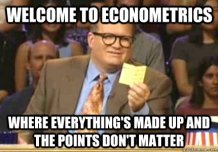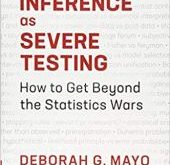We are calling for a stop to the use of P values in the conventional, dichotomous way — to decide whether a result refutes or supports a scientific hypothesis … The rigid focus on statistical significance encourages researchers to choose data and methods that yield statistical significance for some desired (or simply publishable) result, or that yield statistical non-significance for an undesired result, such as potential side effects of drugs — thereby invalidating...
Read More »The gender pay gap and discrimination
The gender pay gap and discrimination Spending a couple of hours going through a JEL survey of modern research on the gender wage gap, yours truly was struck almost immediately by how little that research really has accomplished in terms of explaining gender wage discrimination. With all the heavy regression and econometric alchemy used, wage discrimination is somehow more or less conjured away … Trying to reduce the risk of having established only...
Read More »How to teach econometrics
How to teach econometrics One way to change the sad state of econometrics — an industry with a huge output but no sales — would perhaps be to follow Ed Leamer’s advice on how to teach it … To take my students on a journey toward real intelligence, I have given them the following assignment: Your boss walks into your office and says, “I read in the newspaper this morning that interest rates are going to increase this year. Is this right, and do I need to...
Read More »Uncertainty
It may be argued … that the betting quotient and credibility are substitutable in the same sense in which two commodities are: less bread but more meat may leave the consumer as well off as before. If this were, then clearly expectation could be reduced to a unidimensional concept … However, the substitutability of consumers’ goods rests upon the tacit assumption that all commodities contain something — called utility — in a greater or less degree; substitutability is...
Read More »Causal inference — what the machine cannot learn
Causal inference — what the machine cannot learn .[embedded content] The central problem with the present ‘machine learning’ and ‘big data’ hype is that so many — falsely — think that they can get away with analyzing real-world phenomena without any (commitment to) theory. But — data never speaks for itself. Without a prior statistical set-up, there actually are no data at all to process. Clever data-mining tricks are not enough to answer important...
Read More »The danger of teaching the wrong thing all too well
The danger of teaching the wrong thing all too well It is well known that even experienced scientists routinely misinterpret p-values in all sorts of ways, including confusion of statistical and practical significance, treating non-rejection as acceptance of the null hypothesis, and interpreting the p-value as some sort of replication probability or as the posterior probability that the null hypothesis is true … It is shocking that these errors seem so...
Read More »AfD — die dümmste Kolonne Moskaus
AfD — die dümmste Kolonne Moskaus .[embedded content]
Read More »Teachers — people that change your life
Teachers — people that change your life .[embedded content]
Read More »Econometric fundamentalism
The wide conviction of the superiority of the methods of the science has converted the econometric community largely to a group of fundamentalist guards of mathematical rigour. It is often the case that mathemical rigour is held as the dominant goal and the criterion for research topic choice as well as research evaluation, so much so that the relevance of the research to business cycles is reduced to empirical illustrations. To that extent, probabilistic formalization has...
Read More »Gedenken an Michail Gorbatschow
Gedenken an Michail Gorbatschow .[embedded content]
Read More » Lars P. Syll
Lars P. Syll







